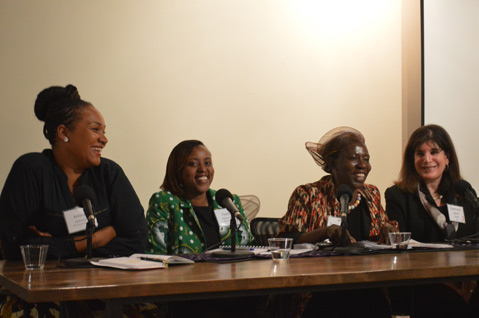Women’s Rights in Africa

Three renowned human rights activists described the successes and challenges facing women’s movements in Africa and elsewhere on Tuesday at an Antioch University panel and networking event, “Architects for Change.” In a talk moderated by Santa Barbara County Supervisor Janet Wolf, President and CEO of the Global Fund for Women Dr. Musimbi Kanyoro, feminist activist and Global Fund board member Amina Doherty, and FEMNET Head of Advocacy Yvette Kathurima spoke of their advocacy work on their home continent, and spoke to the need for greater connectivity in the global effort to secure equality for women.
The talk centered on the work of the Global Fund for Women — a non-profit that funds humans rights initiatives around the world — and the groups they support. To date, the Global Fund has given over $120 million in grants to over 5,000 organizations in 175 countries who have worked to change laws and policies on women’s political, sexual, reproductive, and educational rights. Kanyoro described her organization as an “intergenerational and international” board “without borders.” Doherty, a member of the Global Fund board, praised her organization’s funding efforts in light of the “minuscule amount” of funding available for women’s groups globally — women’s nonprofits, she said, work on a median amount of $20,000.
Kathurima, who works for the Global Fund-funded pan-African communication network, FEMNET, described her organization’s successful efforts to influence policy across the continent on issues such as female genital mutilation, forced marriage, and increased school safety, following last year’s Boko Haram kidnapping. FEMNET, she said, collects “women’s lived realities and attitudes and amplifies those voices at the regional level.”
Kathurima and Doherty characterized the deep cultural divide across Africa between policymakers and citizens in areas like women’s rights and same-sex unions, with fundamentalists in power decrying gender and marital equality both as un-African. Kathurima said “the criminalization is the actual thing that is un-African,” while Doherty added, “Oftentimes, culture has been used to oppress women and suppress women’s rights, but we can’t use the title of culture to limit the rights of women.” The two agreed that shaping understanding comes from influencing the right political stakeholders and making known the demands of female constituents.
A greater global understanding of shared human rights begins locally, Kanyoro said. “One way of understanding global issues is to say, what is happening in our own community? Even if this is not my issue, then it is the issue of my other sister in another country in another part of the world.” Trafficking and kidnappings “do not happen in isolation,” she said, “they happen because the ground enables them.”
The three panelists emphasized the importance of developing and fostering connections between female leaders and advocates. Kathurima described the need for more female political spaces. “We need to be open to learning from other contexts, using other intelligences and technologies to lesson the divide and share experiences,” she said.
“It’s so important to have these spaces – we rarely get the opportunity to meet other women as passionate and committed to supporting women organizing around the world,” Doherty said.
Supervisor Wolf said the panelists “represent the best and most wondrous in what women have to offer.”



